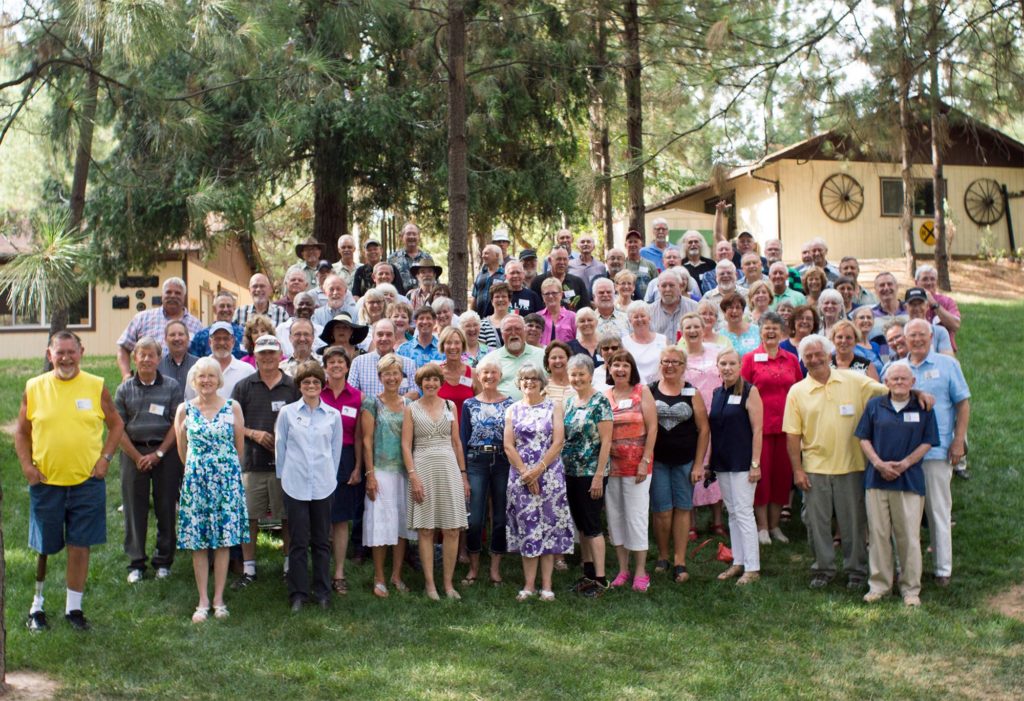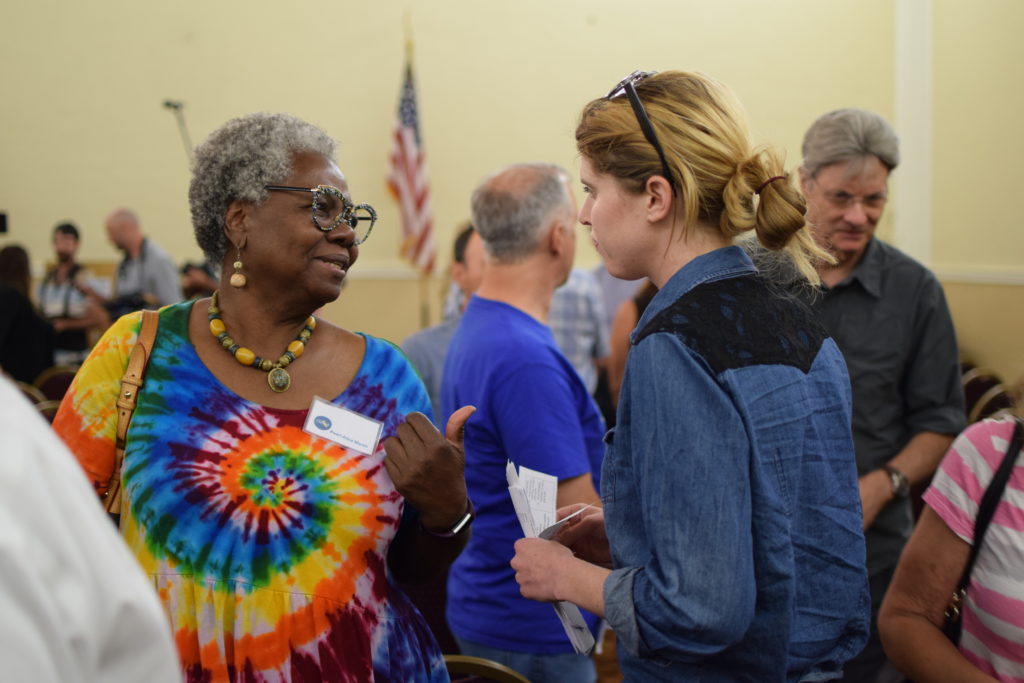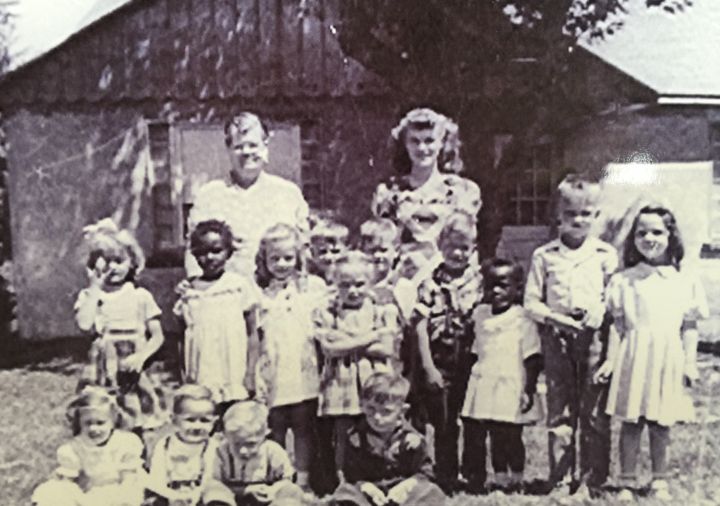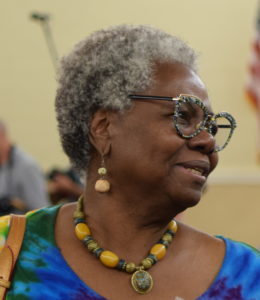With a Master’s Degree in Public Health and a PhD in Political Science, Pearl Alice Marsh is one of our most learned Valley citizens. A pioneer and trailblazer all her life, she was the first African-American female to achieve a PhD in Berkeley’s Political Science Department.
She is retired in the city of Patterson after a decades-long service in the United States Congress in Washington D.C. Her father was a logger in Wallowa, Oregon, before moving the family to Grass Valley in California. At 73, Dr. Marsh is still exercising her political citizenship through local activism. In addition to her many other accomplishments, she may be one of a tiny few people worldwide who somehow manage to look distinguished and regal while wearing a tie-dyed shirt.
VC: There’s a photo of you at a class reunion and you are the only black person in the picture. Were you always the only black person in class in grammar through high school, or were there others?
From my first grade until graduation from high school, my brothers, sister and I were the only African-American children in our schools. My father was a log cutter and, as my mother would say, “we have to live where the trees are.”
Though we were the only African-American kids in our school, we were fortunate to have plenty of friends. But this is America. There also were racists in the towns and they taught their kids how to be little racists. Fortunately for us, our parents taught us from a very early age how to deal with racists – don’t be intimidated and strike back verbally, though once in the first grade I did throw a little boy under his desk for calling me the N-word. When I explained to the teacher, she just told me not to do it again.

VC: You were the first Black female to achieve a PhD in Political Science at UC Berkeley. How many Black people were in your graduate classes? How difficult was it to achieve that degree?
While Berkeley had a great reputation for being a radical school based in large part on the Free Speech Movement in the 1960s, the Political Science Department was not the same. Particularly, the American Politics faculty members were notoriously hostile to anything they perceived to be, “affirmative action,” whether it was or not.
When I entered, there were two African Americans and two Hispanic students in my class. We would play our version of a parlor game by identifying what percentage of the minority students we each were. I could claim to be, “50% of the Black students and 100% of the Black women,” and my friend Andres Jimenez was, “50% of the Hispanic students and 25% of the minority students.” There was much irony in our humor.
Out of the four of us, I believe Andres and I completed the doctoral program. It wasn’t the academic rigor that eliminated minority students who came after us, it was the intellectual isolation. I remember a professor in International Relations introducing the game of “chicken” to explain the balance of power theory. A student was from Los Angeles and weighed in with a “local” metaphor – drag racing – that didn’t comport with his theory. The professor was outraged, humiliated her, and she was gone at the end of the semester.
I navigated my way to supportive faculty members inside and outside of the department and a network of friends and survived. I also got involved in the City of Berkeley’s “foreign policy,” which helped bolster my confidence and fine-tuned my politics through those years.
Lastly, I was raised to never give up and that I was as smart and as good as or better than the next [white] person. So there was no way I wasn’t going to complete my doctorate and dishonor my parents’ teaching.
VC: You have a philosophy you call “pragmatic pessimism” Can you give us the short version of that philosophy and explain how it developed?
As a Progressive Democratic policy wonk, I’ve always been what Jennifier Szalai recently described as a, “cold-eyed realist,” with a, “stubborn moral purpose.”Within the broader progressive movement, there are some who provide moral and ideological clarity to guide a progressive agenda. On the other end, there are those who have to translate those ideals into public sector practice or policy and legislation. The latter often means compromise that gets one in trouble with idealists.
“Pragmatic pessimism” relies heavily on close allies who maintain a clear moral purpose. While “pessimism” can be debilitating, “pragmatism” is solution driven and values the accumulation of what appear to be short-term gains that fall short of the ideal.
I think being an elected official is the strongest test of that polarity between “realism” and “moral purpose” and “pragmatism” and “pessimism.” And having to be pragmatic often keeps one perched on the knife’s edge with constituents.
VC: After working in Washington DC and traveling to foreign countries, you settled in Patterson. What brought you to the Valley?
I retired from my Congressional career and wanted to come home to California. My old community, of course, was Berkeley, but my sister had retired and moved from San Jose to Patterson and was alone. So, I chose to move out here to be near her.
I will confess, finding “purpose” in Patterson took a while. I went from one of the world’s power centers, the U.S. Congress, to a pretty isolated reality. And I was used to progressive politics in Berkeley and not quite prepared for the conservative environment in Stanislaus County.
But I believe in “finding a purpose” wherever and I found two: First, I began aggregating decades of writing, family history and genealogy and started organizing the “legacy chapter” of my life. Second, I joined the Josh Harder campaign and learned a lot about local politics and progressive activism in the area and made new friends. The rest is history.

VC: What have been some of your most exciting and rewarding assignments?
There are two signature assignments I was blessed with as a Democratic Congressional staff member in Washington, D.C. The first was an opportunity to write legislation to preserve and make available electronically to the public the post-Civil War Freedmen’s Bureau Records that made previously inaccessible historical records accessible online. The second assignment was writing the original $15 billion bill, called “PEPFAR,” to fund the U.S. global HIV/AIDS initiative, targeting 15 African countries. That bill is responsible for saving millions of lives globally. While working closely in partnership with the AIDS advocacy community, we produced a great bill.
VC: You seem always willing to volunteer and serve, no matter how humble the task. Is that part of your personality or something you have learned along the way?
I have certainly been in high positions, even meeting face-to-face with African heads of state and high powered international dignitaries in Washington. But I think there is power in humility. One of a handful of books that guided my political development was Paulo Frere’s Pedagogy of the Oppressed, a teaching theory that relies on a critical thinking partnership between teachers and students. At any one time, one is either the teacher or student. I highly recommend that book to political organizers.
I believe in passing the torch. At this stage of my life, I need no accolades or prominent position to feel significant. And there’s nothing more exciting than the energy and activism of young people. I do enjoy social media and am very active on Facebook. So now, it’s “check book” activism for me while I enjoy the legacy phase of my life.
VC: What advice do you have for young people who might be discouraged by our lack of progress on social and economic issues?
I would tell young people their anxiety is warranted. The current crises of race, stalled aspirations for both youths of color and white youth, the obscene wealth gap, environmental degradation, student debt and uncertain job future, are quite frightening.
But I would also say, turn that sense of discouragement and despondency into positive impatience and action. Frederick Douglass said, “power conceded nothing without a fight, it never did and it never will.” Sometimes change comes in leaps and bounds and other times it’s scratched out inch by inch. To paraphrase Nelson Mandela, “Change is always impossible until it happens.”
VC: You mentioned being inspired by the work of Paulo Freire. What other writers have inspired you and informed your worldview?
There are too many books and authors to count. Of course, being an activist from the 60s, I cut my teeth on Rules for Radicals, by Saul Alinski. James Baldwin’s, The Fire Next Time, examined for me the enduring conundrum of racial tension while inspiring the need to embrace and create change.
Lastly, for a somewhat wry reflection on the 1960s, Thomas Wolfe‘s, Radical Chic and Mau-Mauing the Flack Catcher, offered a farcical critique of the 60s movement just to lighten things up. Even in the worst times, you have to be able to laugh.
VC: What is the title of the most recent book you’ve read?
I’m actually reading three books right now ( book clubs): Fledgling, an African-American vampire tale by Octavia Butler, and, Begin Again: James Baldwin’s America and Its Urgent Lessons for Our Own, by Eddie Glaude, Jr., And, How to Be An Anti-Racist, by Ibram X. Kendo, the latter two for obvious reasons, given the times.

VC: In an era of identity politics and linguistic dislocation, Dr. Marsh has developed her own unique term to describe her evolving American identity. She discussed what she means in a recent Facebook post:
I’m thinking about the beginnings of my life in Oregon where, as a little black girl, while southern African-American was at the center of my being, all the cultures of my neighbors seeped in — southern white, German immigrant, white Cajun, all religions, etc.
In moments of social, cultural, and political turmoil, language itself is thrown into upheaval. In terms of race relations, since my African-American childhood in the 1950s until now, I have witnessed and experienced the language debate from “melting pot“ to “integration“ to “color blind” to “assimilation“ to “multicultural“ to “intersectional.” So as a placeholder, I’m using, “intercultural,” which to me personally means that my life is a mélange of all of the cultures that have swirled about and through my life. Intersectional doesn’t work for me, as I understand it.
To me, for the moment, it’s an organic experience, not an intellectual construct, so I can tell you what it feels like. My experience of becoming the “American” I am today has been the result of an “intercultural” process. And what do I mean? I think I mean the following:
While my overwhelmingly dominant cultural identity is African-American, rooted in my southern slave ancestry, my contact with other American cultures has helped shape who I am today. (My Ubuntu) This hasn’t been a process of choice, as it’s been a process of osmosis — the constant social and cultural interactions with others unlike me.

To simplify for myself, I take and paraphrase the biological definition of osmosis —
“the organic process by which aspects of different cultures brought to America pass through the original existential being of each American thus creating within each generation a new, slightly recast being of the original.”
I use this term to help me understand the newness of the cross-cultural participation in the anti-police violence and anti-white supremacy movement in cities and towns across our country.
For the moment, the word “intercultural,” as I’ve defined it, best describes what I observe of millennials and Gen-Z activists and, indeed, the global movement supporting the Black Lives Matter protests.
Can we trust the new movement more than previous iterations of our common struggle to overcome white supremacy and patriarchy?
I’m hopeful!

What a grand piece about a grand lady.
May I add that there is a video of her I took while we were on a committee fostering Hispanic involvement in Josh’s first campaign? https://vimeo.com/287930008
And her sister Kay is also there, at: https://vimeo.com/287899810
– Richard Anderson
How fortunate we Valley folks are to have a person with so much intercultural. information land on our doorstep. The questions opened the way for storytelling at its best. Thank you.
This is a wonderful article on Pearl Alice Marsh, an exceptional person in so many respects. I’ve been trying to reach her and the numbers I have are all disconnected. Will someone please put me in touch?
Thank you.
Margot Dashiell
[email protected]
Try reaching Dr. Marsh via Facebook messenger.